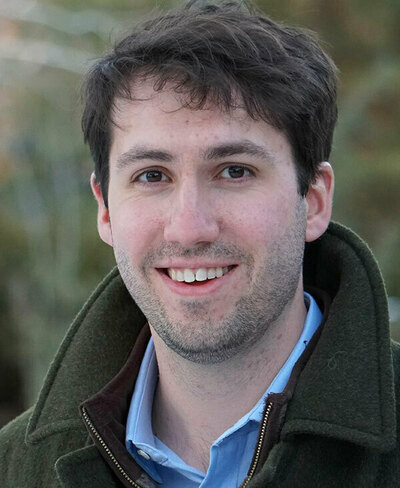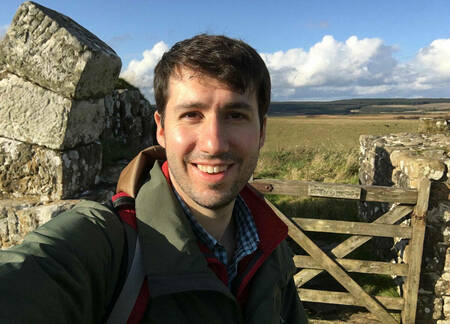
This Q&A is part of an ongoing series with Arts and Letters graduate students. Read more Q&As with graduate students and faculty members here.
Karl Berg ’22, who earned an M.A. in Early Christian Studies from Notre Dame’s Department of Classics, is co-organizing the Inaugural Graduate Conference on Early Christian Studies, to be held May 23–25 in Jenkins Nanovic Halls and on Zoom.
The conference, which will be the first of its kind in the United States, is free and open to the public. It is co-sponsored by the College of Arts & Letters, the Institute for the Scholarship in the Liberal Arts, the Medieval Institute, the Department of Classics, the Department of Theology, and the Nanovic Institute for European Studies. Berg will present a paper, “Augustine of Hippo and Late Roman Slavery.” Next up for the Littleton, Colorado, native: pursuing a D.Phil. in ancient history at the University of Oxford.
Tell us about the M.A. in Early Christian Studies. Why did you choose to pursue it and what makes it distinctive?
Notre Dame’s M.A. in Early Christian Studies is really quite unique among master’s programs in the United States. It unites two departments: Classics and Theology, and this arrangement helps its students to better engage early Christian literature on its own terms — that is, by examining early Christian texts within the ambient context of the classical and late-antique worlds.
In this program, students are offered an opportunity to take theology courses, while further strengthening their facility in the classical languages (Greek and Latin). At first, it was this opportunity which attracted me to the program. However, as early as my first term here, I quickly realized that the Department of Classics offered me far more than mere language instruction. I now feel comfortably embedded in the classical world and classical thought, and I would consider myself as much a classicist as a scholar of early Christianity.
What are your research/academic interests and why are you inspired to explore this topic(s)?
My research interests are quite broad, and during my time at Notre Dame, they have certainly expanded. I entered the ECS program with a strong desire to research early Christian apologiae and the scope and nature of second- and third-century Roman persecutions of Christian communities. I am still keenly interested in these topics. However, I have also developed strong research interests in ancient historiography (particularly Herodotus, Thucydides, Tacitus, and Cassius Dio), the imperial propaganda of the Augustan age, and the development and evolution of the Roman imperial cult.
In particular, I am fascinated by how Christians negotiated and renegotiated their relationship to the cult (and to the emperor) over the course of the Roman Empire’s Christianization. Over the next few years, I plan to devote my attention to this last topic as I write my doctoral thesis.
“Equally important for the success of the conference is bringing some of the best scholarship of postgraduate students at other universities to our campus to establish Notre Dame as an international hub of early Christian scholarship.”
How do you intend for your research to contribute to knowledge or benefit others?
One thing I’ve found particularly rewarding in my study of early Christianity is how many people I’ve encountered who are deeply invested in what I’m researching. Christians make up around 30% (~2.5 billion people) of the world’s population, and since Christianity is a faith so inextricably linked to historical figures and the history of the late-ancient Mediterranean, I’ve found that Christians are typically quite interested in learning more about how their faith spread from the backwaters of Roman Judea to become the leading religion of the Mediterranean world — all within the relatively short span of a few centuries.
Studying early Christianity and the Christianization of the surrounding Mediterranean has also given me the opportunity to examine the roots of issues which remain critically important to our society today. Some of the earliest and most eloquent cases for the freedom of religion and the equality of all people were made by Christian authors. The marriage of Christianity to the Roman state in the fourth century CE also presents an interesting case study of the pitfalls that the politicization of a religion can bring.

Why did you choose Notre Dame?
I chose to come to Notre Dame because of the University’s strong academic reputation and the congruity of my interests with the Early Christian Studies program made it stand out as the ideal environment — where I wanted to be. When I applied, I was completing an M.A. in classical and Roman archaeology at Durham University in the United Kingdom. This program gave me the opportunity to study early Christian communities from a material (archaeological) perspective, but I knew there was far more to be gleaned by approaching these communities through their texts. The ECS program at Notre Dame gave me the opportunity to do this and to synthesize both textual and material approaches to early Christianity and the Christianization of the ancient Mediterranean world.
Notre Dame’s faculty has been terrific to study under, and I have thoroughly enjoyed courses on Augustine of Hippo, St. Paul’s Letters, Greek and Roman archaeology, and Herodotus. The highlight that stands out most vividly, though, is a course which I took on Greece under Roman rule that gave me the opportunity to really dig into my research interest in the Roman imperial cult and its expansion throughout the Mediterranean world.
Tell us about the conference you’re coordinating with Rachel Edney. What inspired it?
The field of early Christian studies is relatively small. Because of this, there are limited opportunities to discuss our research with other graduate students examining similar topics. The Inaugural Graduate Conference on Early Christian Studies aims to amend this and will provide postgraduate students in Notre Dame’s ECS, classics, and theology programs with a venue to present their best scholarship to a broader audience of peers and academics. Equally important for the success of the conference is bringing some of the best scholarship of postgraduate students at other universities to our campus to establish Notre Dame as an international hub of early Christian scholarship.
As we started receiving abstracts for the conference, we were very pleasantly surprised by how much interest it generated — both in the U.S. and abroad. We received submissions from students studying early Christianity and late antiquity at universities around the world.
I hope that this conference will provide a helpful networking opportunity for these students to learn from each other’s research and gain a broader exposure to the rich diversity of the field. I am very excited to be participating in the conference and co-coordinating the event.
Tell us about the research you are presenting at the conference.
I will be presenting a paper on Augustine of Hippo and late Roman Slavery. I became quite interested in this topic last year after reading a letter of St. Augustine which was rediscovered relatively recently (by historical standards) by Johannes Divjak in 1969.
What is remarkable about this letter (Ep. 10*) is that Augustine provides a rather detailed picture of human trafficking networks in the ancient Mediterranean and laments the prevalence of slavers in his native North Africa. He calls upon imperial authorities to pass legislation to curb these slavers’ activities, and, even more remarkably, he recounts a dramatic incident in which his own congregation forcibly liberated 120 enslaved people in a raid on a slave ship, docked at Hippo-Regius. I think that it is not only remarkable that this letter survives, but also that in one of the most seminal figures of the western intellectual and religious tradition, we find such fierce opposition to the institution of slavery.
What’s next for you?
After Notre Dame, I will be traveling with my wife to Oxford, England, where I have accepted a Clarendon Scholarship to pursue a D.Phil. in ancient history at the University of Oxford. In the U.K., I look forward to continuing my research and the proximity which I will enjoy to the Ashmolean Museum and the British Museum.
Originally published by at al.nd.edu on May 17, 2022.